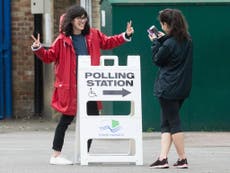Politicians have already failed young people – now they’re ignoring them in this election too
Unless parties do more to engage the issues they care about, the ‘youthquake’ of 2017 could be reduced to little more than a tremor this time around

Brexit burnout is affecting us all – but with an election coming, this is no time to switch off the news and tune out of politics.
For the hundreds of thousands of 18-year-olds who’ll be eligible to vote for the first time in December, however, it may be even harder to think past the “B” word.
Since the EU referendum, we’ve been in Brexit deadlock. That means for someone who’s just had their 18th birthday, for almost a fifth of their time on this planet, the entire political and news agenda has been consumed by a single issue – and one they had no say over.
A quick straw poll of first time voters showed that politics over recent years has left young people feeling worried and anxious about their futures and finding the idea of voting in the general election on 12 December pretty daunting.
Coming of age at a time of such uncertainty and growing polarisation could cause many young people to feel disillusioned. And who can blame them?
Although it’s thought 72 per cent of those aged 18-24 turned out to vote at the 2017 general election, I worry that constant exposure to a 24-hour news cycle about seemingly nothing but the “B” word could serve to switch them off from politics entirely. The youthquake of 2017 could be reduced to little more than a tremor this time around unless parties do more to engage young people and demonstrate that politics can work for them.
As with adults, the most vulnerable groups are the least likely to engage – especially if politicians are seen to be more interested in an endless debate about Brexit than about the more tangible issues affecting their every day lives. At Barnardo’s, we support children who grow up seeing their parents not in work or battling debt while working three jobs; when mental health issues and addiction are seen as normal, and when it can feel like joining a gang is the only way to help your mum pay the rent.
It’s welcome that all main parties are promising to reinvest in public services, but over recent years, the safety net these families rely on has been stretched to breaking point. Children and families are calling out for better mental health support, for safe spaces in their communities, and for a clear path to a positive future, to help tackle the “poverty of hope” that risks taking hold.
But if politicians don’t engage with these issues, they will not connect with younger voters.
The old trope that young people do not engage in politics is outdated, and generations Y and Z are far from apathetic, but Westminster needs to do more to make them believe they have a voice.
Young people all around us are shaking off labels and showing they care deeply about issues like the environment. Millions of children and young people the world over took to the streets in the past year in protests over climate change inaction, inspired by teenage activists like Greta Thunberg, Ridhima Pandey, Kaluki Paul Mutuku, Aditya Mukarji, Nina Gualinga, Autumn Peltier and Leah Namugerwa.
They’re a lot more politically astute than we often give them credit for. Polling by Barnardo’s earlier this year revealed young people worry about a range of “adult” issues including climate change, Brexit and the economy. And it’s these astute 16 and 17-year-olds – 1.5million of them – who will miss out on having their say on December 12.
So at Barnardo’s, we support the lowering of the voting age to 16 in Westminster elections to ensure greater representation of children and young people at a national level. In Scotland, 16-year-olds are already able to vote in elections for local councils and the Scottish parliament, and Wales is now due to follow suit. Surely it makes sense to give the next generation the tools they need to exercise their citizenship? Starting with local elections in England too, would be a good test case and allow young people to have a stake in their community.
When I talk to young people we support, at the top of their agendas are food banks, gang violence, mental health and staying safe online. And they want to know they have a secure future – from housing to education to jobs. Vote or no vote – their voices and their concerns must be heard in this election.
What happens on 12 December could set the political direction for the UK for decades to come, so it’s vital that – if the main political parties are serious about making it about more than just Brexit – they all reach out to young people. They’re the ones who will have to live longest with the outcome and who are best placed to speak up on issues that affect their younger peers.
Fittingly, this month sees the 30th anniversary of the UN Convention on the Rights of the Child, which commits the UK and countries around the world to involving children in decisions affecting them, and acting in their best interests.
We’ve seen recently how young people are willing to take to the streets to protest about issues they care deeply about, but to maintain a healthy, representative democracy, we need to do much more to engage them in the political mainstream as well.
After all, it’s their future too.
Javed Khan is the CEO of Barnardo's



Join our commenting forum
Join thought-provoking conversations, follow other Independent readers and see their replies